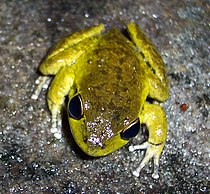Lesueur's frog: Difference between revisions
m WolfmanSF moved page Lesueur's Frog to Lesueur's frog: Change to sentence case species common name as specified in WP:MOS |
m Change to sentence case species common names as specified in WP:MOS |
||
| Line 1: | Line 1: | ||
{{Taxobox | name = Lesueur's |
{{Taxobox | name = Lesueur's frog |
||
| status = LC | status_system = IUCN3.1 |
| status = LC | status_system = IUCN3.1 |
||
| image = Lesueurs Frog09.jpg |
| image = Lesueurs Frog09.jpg |
||
| Line 16: | Line 16: | ||
}} |
}} |
||
[[Image:Litoria lesueuri male.jpg|thumb|left|210px|Male Lesueur's Frog]] |
[[Image:Litoria lesueuri male.jpg|thumb|left|210px|Male Lesueur's Frog]] |
||
'''Lesueur's |
'''Lesueur's frog''' (''Litoria lesueuri'') is a species of ground-dwelling [[tree frog]] native to south-eastern [[Australia]], from [[Sydney, New South Wales]] to eastern [[Victoria (Australia)|Victoria]]. |
||
==Physical description== |
==Physical description== |
||
Lesueur's |
Lesueur's frog is a moderately large sized frog, females of this species reach 7 centimetres (2.8 in), while males reach about 4.5 centimetres (1.8 in). It ranges from pale to dark brown above, however males in the breeding season become bright yellow. There is often darker patches on the back. There is a dark stripe that runs from the snout to the shoulder. The back of the legs are blue with black spots, this helps distinguish this species from the very similar [[stoney creek frog]], (''Litoria wilcoxi''). The top half of the iris is pale and the bottom half dark. The toe discs are small and the belly is white. |
||
==Ecology and behaviour== |
==Ecology and behaviour== |
||
[[Image:Litoria lesueurii spawn.jpg|thumb|192px|left|Lesueur's |
[[Image:Litoria lesueurii spawn.jpg|thumb|192px|left|Lesueur's frog spawn.]] |
||
Lesueur's |
Lesueur's frog is associated with rocky streams and creeks in coastal heath forests, montane areas and rainforest. Males make a soft purring call from beside creeks or from pools on the edges of streams during spring, summer and autumn. Breeding occurs mostly after rain. |
||
An average of about 1630 eggs are laid in single clump loosely attached to bedrock in streams. The eggs are normally laid in still pools of streams. Hatching occurs up to a week after laying. Tadpoles reach about 4.5 centimetres (1.8 in), and are golden brown. [[Metamorphosis]] occurs during summer and autumn, about 50–60 days after laying. Metamoprh frogs are small, about 1.4 centimetres (0.6 in) and resemble the adult, however the dark stripe on the head isn't very prominent. |
An average of about 1630 eggs are laid in single clump loosely attached to bedrock in streams. The eggs are normally laid in still pools of streams. Hatching occurs up to a week after laying. Tadpoles reach about 4.5 centimetres (1.8 in), and are golden brown. [[Metamorphosis]] occurs during summer and autumn, about 50–60 days after laying. Metamoprh frogs are small, about 1.4 centimetres (0.6 in) and resemble the adult, however the dark stripe on the head isn't very prominent. |
||
Revision as of 04:02, 27 December 2012
| Lesueur's frog | |
|---|---|

| |
| Scientific classification | |
| Kingdom: | |
| Phylum: | |
| Class: | |
| Order: | |
| Family: | |
| Genus: | |
| Species: | L. lesueuri
|
| Binomial name | |
| Litoria lesueuri | |

| |
| Distribution of the Lesueur's Frog | |

Lesueur's frog (Litoria lesueuri) is a species of ground-dwelling tree frog native to south-eastern Australia, from Sydney, New South Wales to eastern Victoria.
Physical description
Lesueur's frog is a moderately large sized frog, females of this species reach 7 centimetres (2.8 in), while males reach about 4.5 centimetres (1.8 in). It ranges from pale to dark brown above, however males in the breeding season become bright yellow. There is often darker patches on the back. There is a dark stripe that runs from the snout to the shoulder. The back of the legs are blue with black spots, this helps distinguish this species from the very similar stoney creek frog, (Litoria wilcoxi). The top half of the iris is pale and the bottom half dark. The toe discs are small and the belly is white.
Ecology and behaviour

Lesueur's frog is associated with rocky streams and creeks in coastal heath forests, montane areas and rainforest. Males make a soft purring call from beside creeks or from pools on the edges of streams during spring, summer and autumn. Breeding occurs mostly after rain.
An average of about 1630 eggs are laid in single clump loosely attached to bedrock in streams. The eggs are normally laid in still pools of streams. Hatching occurs up to a week after laying. Tadpoles reach about 4.5 centimetres (1.8 in), and are golden brown. Metamorphosis occurs during summer and autumn, about 50–60 days after laying. Metamoprh frogs are small, about 1.4 centimetres (0.6 in) and resemble the adult, however the dark stripe on the head isn't very prominent.
In 2004 this species was divided into 3 separate species, with the Stoney Creek Frog (Litoria wilcoxi) north of Sydney and Litoria jungguy in northern Queensland.
References
- Anstis, M. 2002. Tadpoles of South-eastern Australia. Reed New Holland: Sydney.
- Robinson, M. 2002. A Field Guide to Frogs of Australia. Australian Museum/Reed New Holland: Sydney.
- Frogs Australia Network
- Frogs of Australia-frog call available here.

